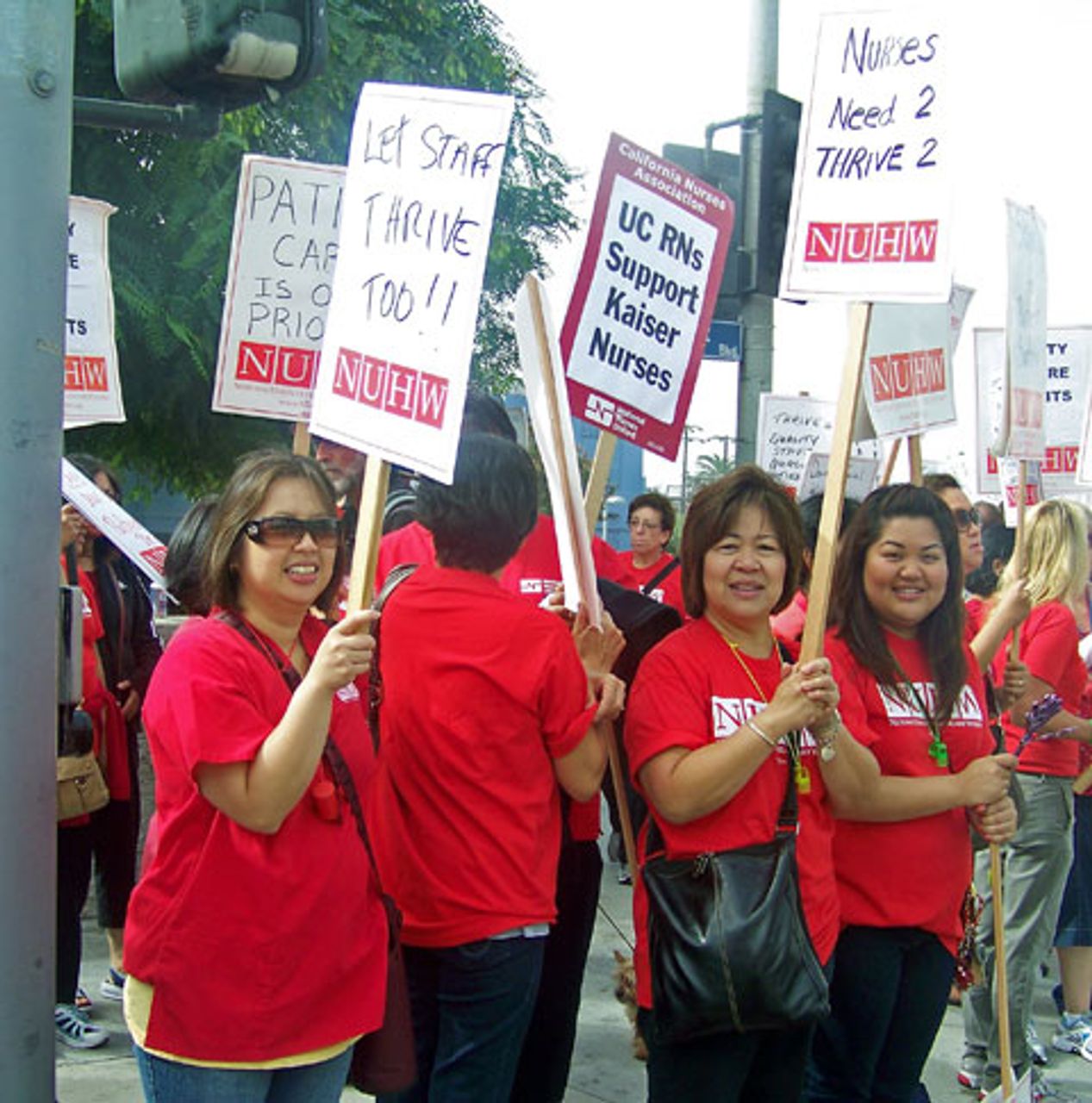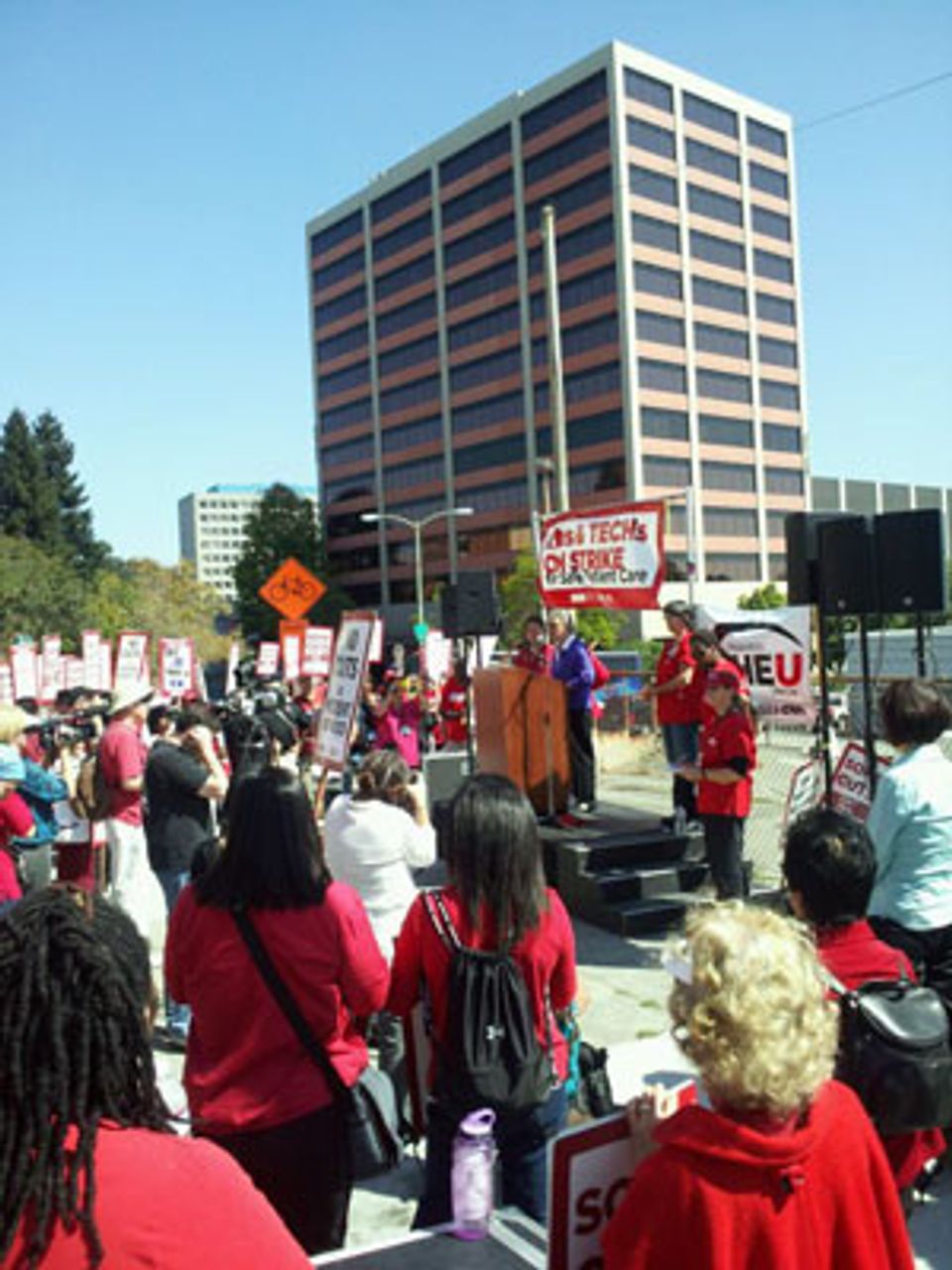 A mass picket of nurses in Sacramento
A mass picket of nurses in SacramentoThousands of nurses and hospital staff across California went on a one-day strike to protest against cuts in pensions and health care demanded by the Kaiser Permanente Health Insurance and Hospital conglomerate.
Talks are currently under way with the National Union of Healthcare Workers (NUHW) to sharply reduce these benefits. The drive by Kaiser to extract concessions from its workers is of a piece with demands by corporations to drive down the living standards of the working class, both in the US and internationally, to levels not seen since the 1930s.
The NUHW organized one-day strike actions this Thursday across the state, which were supported by nurses working at Kaiser. The NUHW is a strong supporter of the Obama administration, which is currently overseeing a nationwide attack on health care programs. (See, "The California nurses strike and the right to health care")
The World Socialist Web Site spoke to striking workers throughout California.
Los Angeles
Joel, a marriage and family therapist, said, “The company wants to take away our defined benefit plan and replace it with a watered-down 401(k) plan."
Like many health care workers, Joel drew a connection between the efforts of workers to defend their benefits and the fight to ensure quality health care to all. "The problems don't stop with us," he said. "The problem of inadequate care has to be addressed as well. Patient access normally takes two weeks, then returning patients often have to wait 4-5 weeks before they see a therapist again. One of my patients recently committed suicide, and it's been on my mind ever since.
 Nurses rally in Los Angeles
Nurses rally in Los Angeles"The inability to provide decent mental health care very likely contributed to his decision to take his life. I think of this while I realize that the company has been able to actually augment its profits.”
The NUHW recently split from the Service Employees International Union (SEIU) and postures as a "left" alternative. Joel commented, “When some of us workers left the SEIU for the NUHW, I thought that, being smaller, the union could be more easily monitored from the bottom. I'm thinking now that this isn't the case.”
Charlie, a psychologist for Kaiser for the last seven years, spoke about issues of understaffing and budget cuts. “We can't get patients back when they need to see us. There aren't enough staff.
“As the number of Kaiser patients has increased, staff has been progressively reduced. This has resulted in more frustration and even depression among our patients.
“The biggest issue is the budget cuts. Kaiser is being run like any other business, on the basis of profit. This means that, as funds for health care are being slashed, Kaiser is not getting reimbursed by federal or state government and therefore will not provide the care needed. This has concrete consequences for our patients.”
He added, "As Kaiser shows an increase in membership [in their health insurance program], that money inflow is being used not for patients, but for other purposes. In addition, Kaiser is cutting our pensions, using the crisis and their non-profit status to get richer. It's absurd. They are attacking providers of health care, cutting health care for everyone, patients as well as those who actually provide health care, like us. And this by a company that claims to be a health care provider!”
Another social worker who requested anonymity said, “A typical example of the impact and consequences of understaffing that I'm personally familiar with is a family with a drug-addicted teenager. They had tried to get an appointment with a psychiatrist but had to wait six weeks. So we took them instead, and we can only do so much for them. Severe problems like this require the assistance of different professionals having expertise in different disciplines, and that rarely happens now. It's a real problem, and we know the money is there to address it.”
On the question of socialism and workers control over health care services, this worker had the following to say: “Having a democratically controlled system would allow us to go above and beyond these strictures; that would be best. In the current conditions, I can't even leave my office to carry out my work in the community, within the patients' families, in social settings. We could be much more effective with an in-depth approach, but corporate interests and especially the insurance companies contaminate the field.
“The company is simply doing what many other companies are doing. They are taking our benefits away, especially pensions. They are implementing policies to push older workers out and hire cheaper, younger workers in order to save money. By so doing, health care deteriorates.”
Karen works as a licensed clinical social worker in a hospice care setting. "Apparently, Kaiser is making $10 million a day in profits, but in the contract negotiations it is preparing takeaways such as an increase in our health insurance payments," she said. "It is also trying to take away our defined benefit pensions. We put in so many years to get a pension, and now Kaiser wants to replace it with a defined contribution system whereby the workers bear the risk in the stock market. The CEOs have eight pension plans and are making millions of dollars in salaries, even though Kaiser is supposed to be non-profit.
"Also, the staffing levels are atrocious. Many co-workers in mental health say it takes them four to six weeks to see patients. I feel we are fighting for all health workers."
Amelia said, "The reason I'm out here is for patient care. I am a licensed therapist, and my pediatric patients wait four to eight weeks for an initial assessment. Then the patients have to wait four to six weeks for a follow-up visit, and then they have to wait six to eight weeks to see a psychiatrist and get medication.
“Also, our nurses are working way above what the nurse-patient ratio allows. That means that instead of two patients per nurse, there are six. And that's illegal. Kaiser is violating the law. And doctors are sometimes given three patients to see in a fifteen-minute period. And they're not allowed to strike. Many of our doctors support us though, and we're quite grateful for that."
San Diego
"I find it ironic," noted one nurse in San Diego, "that people in this profession are facing the loss of their medical benefits despite their work in the field." This nurse noted that her husband owned a small business, meaning that she was the primary provider of medical benefits. "If I lose my benefits, then my whole family does, and we have to start from scratch."
Charlie, a psychologist working for Kaiser, said, "Patients are having to wait longer and longer periods to get treatment. In the past, if it was necessary they could get in right away. Now they have to wait three to six weeks for intake. A follow-up visit can take up to two months, and then we have to start from scratch with intake.
"In years past a follow-up visit would occur in one to two weeks. Appointments with therapists have been cut from every three weeks to up to every two months. Patient rolls have increased while staff has not. Patients have lost access to treatment and are not getting better. Some patients have given up on Kaiser for private treatment. However, most people cannot afford that."
Speaking to the question of pensions, one marriage and family therapist said, "I came into this job with the knowledge that if I worked here for five years I would receive a $400,000 pension. Now they are just trying to take it away and put it towards a small raise (five percent) in our 401(k)."
Oakland
World Socialist Web Site reporters spoke with nurses picketing in Oakland.
 Nurses rally in Oakland
Nurses rally in OaklandMarilyn, a registered nurse from Fair Oaks, said, "It's important to show solidarity when they're trying to take retirement security away. It's important for all unions to show solidarity."
On the pay handed out to executives at Kaiser, she added, "They could pay all of our retirements with that much money. Nobody at that level is worth what they get paid. It's the people out here who made Kaiser what it is today."
John, a registered nurse from Sacramento, said, "There is this movement to get rid of working peoples' benefits. Kaiser is taking advantage of that. I've lost $40,000 in my 401(k) and I want my retirement to be secure. They're trying to tie Social Security to the stock market and that scares me."
Susan, also a registered nurse in Sacramento, said, "Kaiser makes record profits, and CEOs have eight pensions. I've been working as a registered nurse for 17 years. Those people just starting out, what will they retire on? Social Security isn't dependable."
Rick, a registered nurse working in Davis, said, "Since the economy is so bad, [corporations] think they can get away with this. They'll continue to make cuts, too. Bank of America is laying off 30,000 people worldwide.”
"One of the problems is that healthcare and health insurance companies are using the economy as an excuse to make cuts."
Eric, who works in a neo-natal intensive care unit in Roseville, commented, "We had a meeting with the upper echelons of management in Roseville. I was expecting some meaningful information from them but didn't receive it. We're working hard but they're trying to take care of themselves and not us. Kaiser is doing very well. If we need cuts, why don't we ever make them from the top down? They're always taking from the bottom up.”
